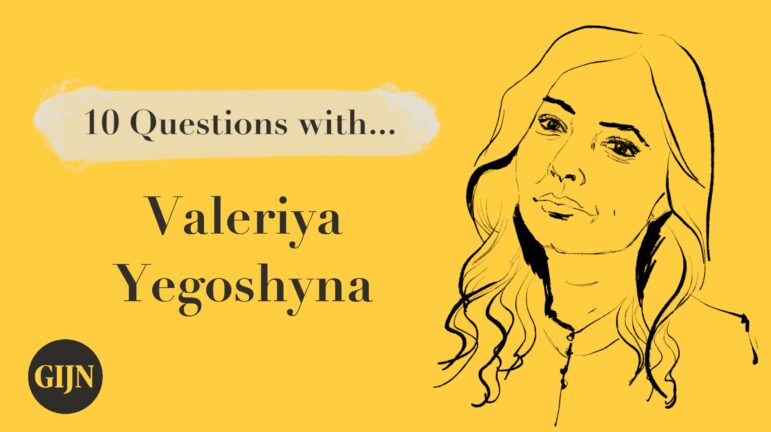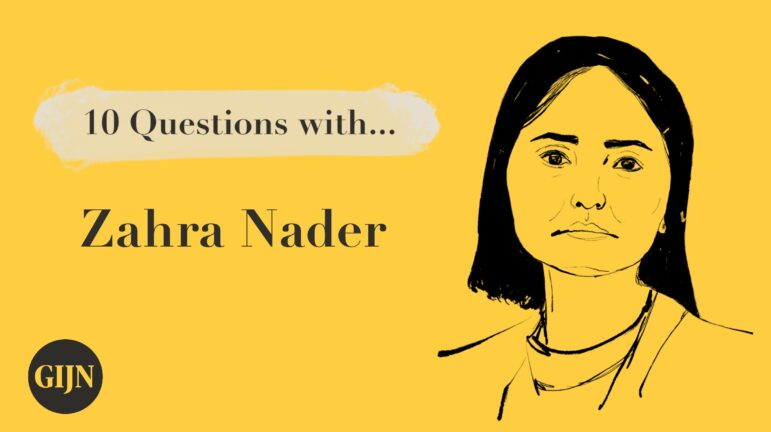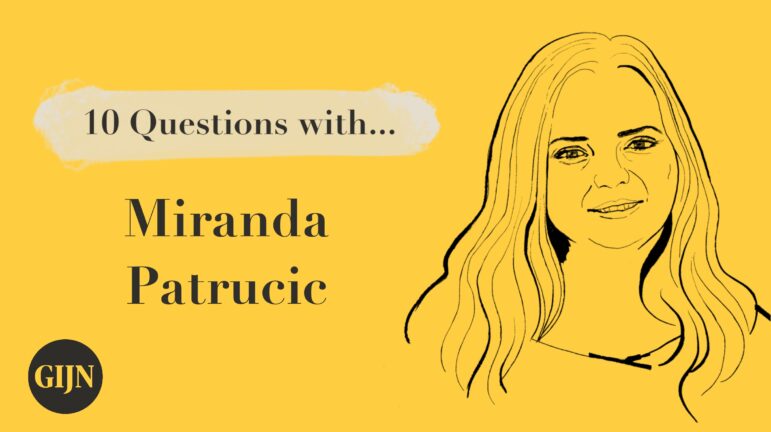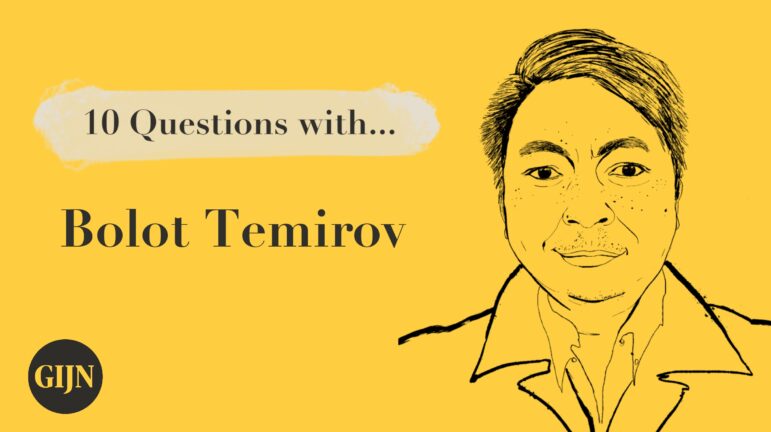

Bolot Temirov. Illustration: Smaranda Tolosano for GIJN
Despite Detention and Forced Deportation, Still Investigating High-Level Corruption in Kyrgyzstan
Read this article in
On November 23, 2022, investigative journalist Bolot Temirov was in a courtroom in Bishkek, the capital of Kyrgyzstan, when the decision for his deportation was announced. The verdict was swiftly carried out. Accompanied by a police convoy, Temirov was taken to the airport and sent to Moscow without any personal belongings or documents.
Temirov, the founder of the YouTube channel Temirov LIVE and renowned for his exposés on corruption within the highest echelons of power, became the first journalist in the history of Kyrgyzstan to be forcibly expelled from his homeland. Before launching his own investigative project, Temirov was the editor-in-chief of the fact-checking website Factсheck.kg. In 2021, he was honored with the US State Department’s “Anti-Corruption Champion” award for his investigative work.
Legal troubles for Temirov commenced after he shed light on the business dealings of relatives of a top national security official in Kyrgyzstan. Multiple criminal cases were subsequently initiated against Temirov as retribution: he was accused of drug possession, use of falsified identification documents, illegal border crossing; and later, Temirov’s passport was canceled. After being deported, he was able to leave Russia, but he keeps his current location secret for safety reasons. International human rights bodies, including the Committee to Protect Journalists (CPJ) and Reporters Without Borders (RSF), urged the Kyrgyz authorities to overturn the deportation decision, while UN Special Rapporteur Mary Lawlor suggested that the court’s decision was “retaliation for his anti-corruption work.”
After his deportation, Temirov, along with his team remaining in Kyrgyzstan, continued to release investigations, including on the “Ayt ayt dese” YouTube channel, where aqyns — improvisational singers — accompanied by folk music, sang journalistic exposes. In January 2024, a court in Bishkek arrested 11 former and current employees of Temirov Live, among them Temirov’s spouse, Makhabat Tazhibek kyzy, on charges of “inciting mass unrest.” They each now face a potential five to eight years behind bars. In solidarity with the detained colleagues, dozens of media outlets and investigative reporters launched a worldwide campaign using the #FreeKyrgyz11 hashtag.
Kyrgyzstan, once considered an “island of democracy” in predominantly authoritarian Central Asia, has experienced a drastic decline in international freedom rankings over the past three years. Since 2021, the country has been listed as an authoritarian state by the Economist Intelligence Unit. Additionally, in the World Press Freedom Index for 2023, Kyrgyzstan dropped 50 positions, now ranking 122nd out of 180 countries worldwide.
For our latest 10 Questions column, Temirov delves into the challenges of investigative reporting and fighting for justice amidst pressures and censorship.
GIJN: Of all the investigations you’ve worked on, which has been your favorite and why?
Bolot Temirov: Every investigation is essentially a team effort, so singling out one is hard. Almost every investigation seems significant to me: you delve into the problem, try to find the truth, and as a result, you discover excessive spending, expenses inconsistent with income, the use of power to appoint relatives to positions, or other forms of corruption. I remember we published an investigation about the expensive gifts an ex-customs official gave to his wife, which exceeded his official income hundreds of times. Shortly after, the Factcheck.kg website was subjected to a DDoS attack and stopped working. All media outlets that reposted [the investigation] were also targeted by DDoS attacks. And even knowing this, they still had it on their websites. It was a sign of unity and support among colleagues. A month later, I became the target of a physical assault.
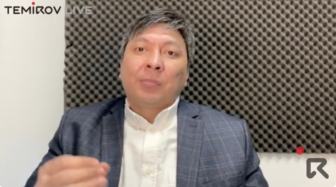
Despite having been deported, Bolot Temriov continues to report on high-level corruption in Kyrgyzstan via his YouTube channel, TemirovLive. Image: Screenshot, YouTube
An investigation into the diversion of profits from a state enterprise by the family of the head of the State Committee for National Security led to a raid on our office and my arrest, and Bolot Nazarov [a renowned improvisational Kyrgyz poet and singer who adapted Temirov Live’s investigations] was also detained. Drugs were planted on us. Now our investigation into the criminal activities of the Minister of Internal Affairs has led to the arrest of our former and current employees. As of today, 8 out of 11 arrested are in pretrial detention, awaiting the results of an Internal Affairs Ministry investigation. Our office has been sealed.
These investigations are crucial in unearthing corruption, as the authorities have failed to refute the evidence we’ve uncovered. Instead of giving answers, they’ve chosen to target us, sending a signal to other investigative journalists: Beware! No investigation can be labeled a favorite. Each one brings to light unpleasant, and at times, horrifying problems of the country. And most investigations still do not receive a fair response in the form of official investigations and court decisions because the subjects of the investigations are those who were supposed to restore the law and order. Of course, they’re hardly inclined to arrest themselves.
GIJN: What are the biggest challenges in terms of investigative reporting in your country/region?
BT: The biggest problem of investigative journalism is fear. Not everyone can overcome this fear. You can be framed with drugs, beaten, or thrown into prison for no reason. But most of our colleagues overcome this fear, no matter how hard the authorities try to intimidate everyone. There are cases where journalists succumbed to the temptation of money, threats, and blackmail. But all these cases eventually become known. There are those who continue to remain committed to the principles of journalism. And now in Kyrgyzstan, all of them are being persecuted. Some newsrooms face threats of closure, my colleagues are being held in prison on trumped-up charges, I was deported, and I haven’t seen my family and loved ones for more than a year.
GIJN: What’s been the greatest hurdle or challenge that you’ve faced in your time as an investigative journalist?
BT: Perhaps, they used all methods against me. Currently, the authorities are trying to determine my location, they might have come up with something new. Physical attacks, surveillance, threats, blackmail, arrests, revocation of citizenship, deportation, and even the arrest of my spouse (who was the team leader after my deportation from the country), and anyone associated with our team. Every time they try to find our sources, seal the office, confiscate equipment. This, of course, greatly hampers our work, but makes us stronger. We overcome our fears, improve our work. For several years now, they have been trying to shut down open data in the country. They concealed officials’ declarations, even physically burned them, closed access to tender results, and much more. They enact repressive laws. Investigative journalism in Kyrgyzstan is going through the toughest times.
GIJN: What is your best tip or trick for interviewing?
BT: I’m not the best interviewer. I’m more of a specialist in open data. But there are many great interviewers in Kyrgyzstan, including investigative journalists. They can get an interview in any situation, ask precise and direct questions. I think it’s all about a combination of audacity in the best sense of the word, persistence, and asking the right questions.
GIJN: What is a favorite reporting tool, database, or app that you use in your investigations?
BT: I always try to update my toolkit. Perhaps I use search engines the most. Well, and OCCRP Aleph – it’s very convenient for searching through multiple databases there.
GIJN: What’s the best advice you’ve gotten thus far in your career and what words of advice would you give an aspiring investigative journalist?
BT: Professional advice: Look for the victims or the aggrieved — or look for the money, who earned it, who benefited. But when I train [aspiring journalists], I always say that they need to have many hypotheses, not just focus on the accusatory or exonerating ones. Probably, everyone I’ve trained knows my phrase: “Even the most fantastic hypothesis can turn out to be true.”
GIJN: Who is a journalist you admire, and why?
BT: Ukrainian investigative journalist Mykhailo Tkach is my role model. His investigations are ones I aspire to, though I know I may never replicate them.
GIJN: What is the greatest mistake you’ve made and what lessons did you learn?
BT: What I regret the most is not having had the chance, although I had the opportunity, to talk to people who have left this world. I try to communicate with people I respect and who do incredible things whenever possible.
GIJN: How do you avoid burnout in your line of work?
BT: It’s disheartening that the reach of investigative publications doesn’t always match their significance. Yes, we’re working very hard to change that. To achieve this, we launched a unique project called “Ayt ayt dese,” where investigations are presented in a simple and understandable way through folk songs. We’ve collaborated with poets, publicists, aqyns [improvisational poets], and other creative minds. Despite the challenges, our dedication remains unwavering. The journalist — also an aqyn — and founder of “Ayt ayt dese” is currently in prison.
GIJN: What about investigative journalism do you find frustrating, or do you hope will change in the future?
BT: I’m working on my fears. I’m constantly striving for self-improvement, discovering new tools. Sometimes I rewatch “The Newsroom.” I particularly like the phrase from the series: “People will stop committing crimes because they know journalists will report on them.”





